Translations 677
Grandparents’ Tales
 Grandparents’ Tales
Grandparents’ Tales

By Lázaro Fariñas
Posted: Monday 07 May 2018 | 07:06:53 PM
A CubaNews translation.
Edited by Walter Lippmann.
I don’t think it’s elegant or attractive to make up personal stories. I think that everyone’s life is their own and private, and if it is ever told, it should be told by others. I don’t know, then, why I’m writing this commentary. Am I getting old? Is it nostalgia for another time? Or do I feel very satisfied with what I did during one stage of my life and I want to talk about it?
At the end of the 1980s, I wrote articles for various publications in Latin America. The Prensa Libre of Costa Rica and the Nuevo Diario of the Dominican Republic were my favorites, and I sent my weekly comments to those media outlets. I never suffered any censorship. It was published just as I sent it, not one comma would be changed. It was not easy to write from abroad to be read in other countries, considering that it was for different idiosyncrasies, ways of thinking and points of view that I sent my opinions. I have to confess, without fear of being pedantic, that I was very well-received by those readers who had few interests in common with me.
Already in 1989, and due to the beginning of the collapse of the socialist camp in Europe, the media in Miami began to open up to me. I began writing articles frequently in El Nuevo Herald of Miami, and was a frequent guest on local television and radio talk shows.
Since the troglodytes of the anti-Cuban right in this city were sure that the fall of the revolutionary government of Cuba was imminent, they dared to give a voice to people who thought differently. At that time, I became an integral part of a daily television program called Debate, where I shared space with two journalists who thought differently from me and always, in addition, with the participation of guests from the far right, who wanted to measure strength with me. Once again, without wanting to be pedantic again, they would come for wool and come out shorn.
In that program, I debated with the cream of the Miami right: heads of counterrevolutionary organizations, “vertical fighters” and coffee and milk leaders were my different opponents. Of course, the two journalists who accompanied me on the show were also my opponents.
When the USSR collapsed, I stopped participating in the program. The real reason was because I got tired of having to wear a necktie every day to go argue with idiots.
Although I was invited regularly to different spaces like this throughout that decade and half of the next, the atmosphere was no longer pleasant. I was increasingly tense and hostile, the more the threats, the more violent the attacks, not only from the directors of those programs but also from the public to whom they opened the phone lines to insult me. Actually, I had enough intelligence, cunning and patience to get around the insults, which, as the saying goes, came in one ear and came out the other; that is, they slipped out the other, for, as is commonly said, to foolish words, deaf ears.
But to continue participating in those media brought with it an enormous sacrifice. In order to defend myself correctly from those verbal attacks, I had to pay attention to what they said on the other programs. I had to hear them every day. I didn’t care about personal offenses, but having to tune in to them was a different matter. The time came when it was like self-flagellating or digesting vomit just for the sake of vomiting.
I remember that when the leader of the Cuban Revolution, Fidel Castro, resigned as President of the Council of State due to health problems, I sent a note to Cubadebate wishing the Commander a speedy recovery. A few days later I was invited to a TV show and they read the note I had sent as if I were being caught in the crowd. I remember telling the director of that program and the journalist who was with her that she not only wanted Fidel to recover from his illness, but also wanted him to return to his post soon.
I have always said, written and done what I believed, I have always been consistent with what I thought.
I was a teenager during Batista’s time, not ten years old when Fulgencio entered Camp Columbia with his gorillas. I did everything I could against him. When after, 1959 I disagreed with some revolutionary measures, I opposed them and left Cuba.
When my homeland was left alone due to the disappearance of the Soviet Union, I began to travel to the island regularly and had the opportunity to meet three or four times with Fidel, a man I always respected and of whom I always publicly affirmed in Miami that he was the island’s best and most faithful defender.
World Orgasm Day
By Tania Rendón Portelles A CubaNews translation. PLENITUDE, ACN Section Perhaps the answer to all your ailments comes by prescription, and do not be alarmed if in this case the doctor prescribes an orgasm, especially when surveys and studies show that a high percentage of women simulate the climax with their partner, which undermines psychological well-being. Multiple questions, in this sense, have troubled scientists for years, since why they are different between men and women, and their most controversial question in the evolution of human sexuality, whether or not the female orgasm is a functional adaptation. Although there is a lot of research to reach a biological or neurophysiological consensus, the female orgasm has yet to carry the burden of a few myths; however, achieving it or not in a sexual act is also a necessity for women. There is something that distinguishes these studies related to sex and sexuality, and it is precisely that pleasure and health go hand in hand, because climax stimulates the main areas of the brain; hence it is considered very appropriate to find possible therapeutic uses of vaginal stimulation. How sexual pleasure can help in the treatment of patients with anxiety, depression or addictions, the scientific answers in this area are directed, and the most interesting thing is that the investigations foresee the benefits on other ailments. However, there is much more, and that is that this activity, recommended several times a week, can bring relief to other problems. According to research, these physical and chemical reactions could have major implications for a person’s health, including treatment of certain diseases. To illustrate this point further, a study at Wilkes University in Pennsylvania found that people who reach orgasm have 30 percent more activated production of an antibody that helps strengthen the immune system. New York doctor Barry Komisaruk showed that by introducing a patient to the soundboard to analyze the effects of orgasm on the brain, they are similar to the stimuli generated by chocolate, nicotine, cocaine, in a region of the brain called the pleasure zone. According to the expert, the reason he became interested in female orgasm was that he found evidence that vaginal stimulation has the ability to block pain, without even needing to reach orgasm. Therefore, so necessary, moreover, to learn to assume and live sexuality fully, women must be able to have their space to explore themselves and know what is important and specific for them in order to achieve orgasm. Pretending, which in many cases has to do with women’s insecurity and emotional dependence, or with a foolish “instinct” to raise one’s partner’s self-esteem by making him believe that he is the best of all possible lovers, attempts to live in harmony with himself. Having the confidence to say or ask for what you want is a right for women, and also to insist that your partner is concerned about giving you the right ecstasy, because sexuality and individuality have their own nuances and rhythms and everyone must recognize which are yours. The councillor of the municipality of Esperantina, Brazil, must be thanked for having promoted the celebration of the World Day of the Female Orgasm, and by law, every 9th of May, they had to make an effort to ensure that their partner could achieve it, although this was later changed to 8th of August, the official date. From that particular beginning, women’s organizations around the world began to promote the event to encourage others to enjoy their sexuality and leave taboos behind. The celebration has now been extended to countries such as Denmark, Norway, Spain, Mexico, Argentina and Peru. Denmark and Norway, for example, pay tribute to women from different eras who went against cultural prejudices and mandates. Meanwhile, in Norway it was declared a holiday, and in Denmark orgasm is mandatory. If it is not fulfilled on that day, the man is fined one year’s abstinence under the supervision of a female police officer. Fortunately, thanks to these campaigns, which, although they may seem extremist, have undoubtedly favored women and have been the starting point for such a relevant issue, many consider that female ejaculation or orgasm is far from being a myth and that it only takes one good lover to achieve it. But the most important thing will still be to open understanding to sexual well-being and to be assertive, in this case to say what pleases you in bed. (Tania Rendón Portelles, ACN) Spanish audio available at this address: trp/trp/jorge/jagm 18 08:55 Por Tania Rendón Portelles PLENITUD, sección de la ACN Quizás la respuesta a todos sus padecimientos venga por receta médica, y no se alarme si en este caso el doctor le prescribe un orgasmo, más cuando encuestas y estudios demuestran que un porcentaje elevado de féminas simulan el clímax con su pareja, lo que atenta contra el bienestar psicológico. Múltiples preguntas, en este sentido, han inquietado a los científicos por años, desde por qué son diferentes entre el hombre y la mujer, y su cuestión más polémica en la evolución de la sexualidad humana, si el orgasmo femenino es o no una adaptación funcional. Aunque hay muchas investigaciones para llegar a un consenso biológico o neurofisiológico, el orgasmo femenino aún tiene que llevar consigo la carga de unos cuantos mitos; sin embargo, alcanzarlo o no en un acto sexual constituye para las mujeres, también, una necesidad. Hay algo que distingue a estos estudios relacionados con el sexo y la sexualidad, y es precisamente que placer y salud van de la mano, porque el clímax estimula las principales áreas del cerebro; de ahí que se considere muy oportuno encontrar posibles usos terapéuticos de la estimulación vaginal. Hacia cómo el placer sexual puede ayudar en el tratamiento de pacientes con ansiedad, depresión o adicciones, van encaminadas las respuestas científicas en este ámbito, y lo más interesante es que las indagaciones avizoran los beneficios sobre otros padecimientos. Sin embargo, hay mucho más, y es que esta actividad, recomendada varias veces por semana, puede generar alivio a otros problemas. De acuerdo con las investigaciones, estas reacciones físicas y químicas podrían tener grandes implicaciones en la salud de una persona, incluso servir de tratamiento para determinadas enfermedades. Para ilustrar más sobre este tema, un estudio realizado en la Universidad de Wilkes, en Pennsylvania, observó que las personas que llegan al orgasmo presentaban en un 30 por ciento más activada la producción de un anticuerpo que ayuda a fortalecer el sistema inmunológico. El doctor neoyorquino Barry Komisaruk demostró que al introducir a una paciente en la caja de resonancia para analizar los efectos del orgasmo en el cerebro, estos son similares a los estímulos generados por el chocolate, la nicotina, la cocaína, en una región del cerebro llamada zona del placer. Según refiere el experto, la razón por la que comenzó a interesarse por el orgasmo femenino fue que encontró evidencias de que la estimulación vaginal tiene la capacidad de bloquear el dolor, sin necesidad siquiera de alcanzar el orgasmo. Por tanto, tan necesario, además, para aprender a asumir y vivir la sexualidad de forma plena, las mujeres deben ser capaces de tener su espacio para explorarse y conocer qué es lo importante y específico para ellas en función de lograr el orgasmo. Fingir, que en muchas ocasiones tiene que ver con la inseguridad femenina y la dependencia emocional, o con un insensato \”instinto\” de levantar la autoestima a su pareja haciéndole creer que es el mejor de los amantes posibles, atenta contra vivir en armonía consigo mismo. Tener la confianza de decir o pedir cómo se quiere es un derecho para las mujeres, y también incidir en que su pareja se preocupe por darle el éxtasis adecuado, pues la sexualidad y la individualidad poseen sus matices y ritmos y cada uno debe reconocer cuáles son los suyos. Habrá que agradecerle al concejal del municipio de Esperantina, Brasil, el haber impulsado la celebración del Día Mundial del Orgasmo Femenino, y por ley, cada nueve de mayo, debían realizar un esfuerzo para que su pareja llegara a conseguirlo, aunque tiempo después se cambió al ocho de agosto, fecha oficial. A partir de ese particular comienzo, organizaciones de mujeres en todo el mundo empezaron a promover la efemérides para alentar a otras a disfrutar de su sexualidad y dejar atrás los tabúes. La celebración se ha extendido ya a países como Dinamarca, Noruega, España, México, Argentina y Perú. En Dinamarca y Noruega, por ejemplo, se rinde homenaje a las féminas de distintas épocas que fueron en contra de los prejuicios y mandatos culturales. Mientras, en Noruega fue declarado como día feriado, y en Dinamarca el orgasmo es obligatorio. De no cumplirse ese día, el hombre resulta multado con un año de abstinencia vigilada por una mujer policía. Por suerte, gracias a estas campañas, que aunque parezcan extremistas, sin dudas han favorecido a la mujer y ha sido el punto de comienzo en tal relevante tema, no pocos consideran que la eyaculación femenina u orgasmo está muy alejada de ser un mito y que solo hace falta un buen amante que lo consiga. Pero lo más importante seguirá siendo abrir el entendimiento al bienestar sexual y ser asertivos, en este caso para decir lo que complace en la cama. (Tania Rendón Portelles, ACN) Audio disponible en esta dirección: https://radioteca.net/userprofile/ain_cuba/ trp/trp/jorge/jagm 18 08:55
Female Orgasm by Prescription?
Edited by Walter Lippmann. [graphic added by translator.]
[graphic added by translator.]
trp lm meb 18
https://radioteca.net/userprofile/ain_cuba/
Orgasmo femenino por prescripción médica
trp lm meb 18
Homophobia Causes School Dropouts
Homophobic harassment causes school dropouts in Cuba, study shows
An investigation gives details on how homo and transphobic bullying operates in Cuban schools, the theme of the annual program of activities that closes on May 18.
By Inter Press Service Cuba Editors
May 8, 2018
Translated and edited by Walter Lippmann for CubaNews

The study identified as times of greatest risk of bullying, school dismissal, school entry and exit, time between classes and recess in the playground. Photo: Jorge Luis Baños/ IPS
Havana, May 8 – Transgender people and lesbian women reported dropping out of school due to bullying, revealed a retrospective research on homophobia and transphobia in schools conducted by the government’s National Sex Education Center (Cenesex).
Conducted by a group of five authors, the exploratory and retrospective study on homophobic and transphobic violence in the school career of lesbian, gay, bi, trans and intersex (LGBTI) activists is the basis for the eleventh edition of the Cuban Days Against Homophobia and Transphobia, which for the second year focuses on schools.
According to the report, to which IPS had access, Cenesex researchers surveyed 90 adults from community social networks accompanied by the Cuban state institution, from Havana, Villa Clara and Santiago de Cuba.
The schooling of the population studied was concentrated in secondary education and, at the time of the research, 25 people were in higher education, mostly gay men.
Dropping out of school
However, 22 subjects indicated that they had dropped out of school at some point in their school career and only nine returned to school, most of whom were trans people seeking to complete high school.
The average age of dropout was concentrated at 16.6 years of age at the end of secondary school, with a majority being transgender people.
Of the 22 people who reported dropping out of school, 13 claimed that the decision was linked to the situations of violence they were subjected to in the school environment, an experience that prevailed among trans people and lesbian women.
Taunts and insults were the most frequent manifestations of harassment recalled by respondents, followed by threats, physical abuse, ignoring and stealing their belongings.
“There is no place in the school environment that escapes the phenomenon,” the report distinguished, identifying as moments of greatest risk the exit and entry to school, the time between classes and recess in the playground.
According to the study, the bathrooms and shelters were the spaces with the highest incidence of acts of abuse inside the schools, with verbal attacls that could be accompanied by physical violence.
The response of educational institutions focused on the change of educational status or the isolation of victims, the report said.
The researchers emphasized that the measures implemented could be considered a form of revictimization, since they impacted on those who suffered harassment and not on those who committed it.
Who are they, anyway?
As the perpetrators of the violence or harassment, the students themselves dominated by a large margin, followed by the teaching staff, support staff and relatives of the victims.
Support networks within the school were virtually non-existent, according to the research, which found a tendency to normalize situations of violence.
The support, when it happened, came from students who were intervening to stop the abuse. The attitude of the teaching staff was aimed at silencing the facts and placing the blame on the victims, the sample studied reported.
The people affected decided not to report violence due to homophobia and transphobia, either because they did not feel prepared to make their sexual orientation public, or because they did not feel ready to report the immobility of the teaching staff, or because they feared the consequences of double stigmatization.
Faced with violent situations, the mechanisms most often used by victims were to ignore what they were told, to isolate themselves, to try not to draw attention to themselves, or to respond aggressively.
The homophobic and transphobic violence experienced had an impact on the mental health of the victims, the study said.
Fears, fear of people’s reaction when reporting, poor school performance and rejection of school were some of the consequences observed.
However, the report argued that when research participants reflect on and evaluate these stages of their lives, they report that such situations have had a positive influence over time because they have strengthened their character.
Conclusions
The study concludes that homophobic and transphobic violence in the school setting reflects homophobia and social transphobia in Cuba.
The return to school and the recomposition of the victims’ life projects is an indicator of change for Cuban society and schools, the report said.
Raising the awareness of youth organizations to function as support networks for situations of violence in the school environment and strengthening the training of teachers and support staff for the prevention of homophobic and transphobic bullying are recommendations of the study.
It also suggests that educational authorities strengthen monitoring of the places where homophobic and transphobic violence is most prevalent.
Universal and free access to education and health, as well as the principles of equality established, are conquests that are endorsed in the current Constitution (1976), in its articles 39 and 50, stated the researchers in the introduction of the study.
However, in its opinion, the reduction of homophobia and transphobia to which lesbians, gays, bisexuals and transgender people on the Caribbean island are exposed remains to be achieved. (2018)
Priorities for the LGBTI Community
My list of priorities for the LGBTI community or An interview at Sputnik
Translated and edited by Walter Lippmann for CubaNews.
During the Days Against Homophobia and Transphobia, the interest of the international media in hearing the opinions and expectations of those of us who advocate for lesbian, gay, bisexual, transgender and intersex (LGBTI) rights in Cuba is growing exponentially.
A colleague who works for the Russian publication Sputnik asked me to comment on the response of Cuban society and its institutions to the educational and advocacy work of the past decade, the progress made, and the issues to be resolved.
Before reproducing here the interview that resulted from this exchange, I would like to complement it with a few ideas that, due to the necessary journalistic synthesis, were left out when editing this text.
On the reactions to the debate on how to deal with discrimination on the grounds of homophobia and transphobia, I would just like to emphasize that the Cuban people have a great sense of social justice, and I would like as a rule to be better at this aspect of human rights too, so that they want to listen to arguments, argue, confront their fears and concerns, and – in the end – understand and grow.
Among the advances I listed, I would also like to rescue the articulation of networks of LGBTI activists – and which also include many heterosexual people in solidarity with our rights – which contributes to the visibility and promotion of these issues.
Finally, in relation to the points to be resolved, Sputnik only included the recognition of homoparental families and their legalisation by marriage or another similar legal form, although my list of priorities was a little longer and more complex.
I will now list those other aspects which I also consider to be still unresolved, and on which we will have to continue to insist in the coming years:
Specific protection against homophobic and transphobic violence and harassment in the Penal Code.
Recognition of gender identity without the need for genital reassignment or court rulings through the Civil Code.
The possibility of assisted reproduction for lesbian couples and the right to adoption for homosexual couples in general.
Affirmative policies to increase access to education and work for trans people.
Non-exclusion of any type of employment, including the armed forces.
Improvement of the procedures for the actions of the police and other institutions guaranteeing socialist legality in order to avoid discrimination on these grounds.
Implementation of curricular and extracurricular programs based on a comprehensive sexuality education that provides teachers, students and families with scientific tools to confront bullying and school violence due to homophobia and transphobia.
WITHOUT FURTHER ADO, SPUTNIK’S INTERVIEW
Cuban discussions against homophobia and transphobia
HAVANA (Sputnik) – The 11th edition of the Program against Homophobia and Transphobia, which will be held in Cuba until 18 May, encourages discussion on the rights of the lesbian, gay, transgender, bisexual and intersex (LGBTI) community, Cuban journalist and activist Francisco Rodríguez Cruz told Sputnik.
“The (Cuban) population knows and discusses this problem, and is eager to receive information about it; there are opinions in favor, and others not so much, that are still related to ancestral prejudices, scientific ignorance and cultural obstacles, but in general the trend seems positive to me,” said Rodríguez Cruz.
The current edition of the program, dedicated to the 30th anniversary of the National Sex Education Center (Cenesex), directed by the daughter of former president Raúl Castro, sexologist Mariela Castro, shows that Cuban society has responded to these meetings with great sensitivity, according to the activist.
“As we enter the second decade of this educational initiative, the issue is already on the Cuban political and public agenda,” he said.
In his opinion, “it is enough to follow the discussions that take place in the journalistic information about these days in the digital media and social networks on the internet, where people comment on their doubts, dissagrements and arguments in favor of respecting LGBTI rights, to appreciate the richness and honesty of the discussion. It ranges a position of wanting to know more, to where many more LGBTI people already participate with visible empowerment”, he stressed.
From the institutional point of view, “it is a strength to have Cenesex, which leads not only these days, but the entire sexual health and education program in the country throughout the year, on multiple topics,” he said.
This makes it possible to coordinate responses with other central government agencies, civil society organizations, universities and scientific and research centres.
“In the last decade, the confrontation with discrimination based on sexual orientation and gender identity was progressively understood and supported by the (ruling) Communist Party of Cuba, which explicitly included it in its most important governing documents,” Rodríguez Cruz said.
“This facilitates discussion within society and its institutions, without this implying absolute understanding by all party militants and people who have responsibilities in decision-making structures of the State and the Government, and who are not immune to the misunderstandings, prejudices and resistances of a non-negligible part of our citizens,” he stressed.
In his opinion, the main advance “is the widespread understanding that homophobia and transphobia constitute an anti-value, something that is not good, is wrong, and therefore, very few individuals assume it as an unbridled position”.
“Even people with prejudices or discriminatory behavior towards the LGBTI community claim to be neither homophobic nor transphobic,” said the activist.
From the political point of view, the inclusion of the principle of non-discrimination based on sexual orientation and gender identity in the Conceptualization of the Economic and Social Model of Socialist Development and in the Strategic Development Plan until 2030 is the main success, according to Rodríguez Cruz.
“Another milestone was the approval in 2013 of the Labor Code, the first Cuban law that expressly protects people from discrimination based on sexual orientation, in this case, in the workplace,” he explained.
In Cuba, there is free, specialized care for transgender people for psychological support, modification of their bodies and genital reassignment when they want it, something that “is also a significant result whose implementation dates back to 2008,” he said.
Unfortunately, however, “there are many more remaining issues,” he said.
“Further progress will have to be made in the implementation of legal norms and public policies that guarantee equal rights for LGBTI people, in areas such as the recognition of the families we constitute and their legalisation through marriage or another similar legal forms,” he said.
LGBTI activist hopes that some of these issues will come up during the debates and proposals that will accompany the already announced process of reforming the Constitution, and others will require further work of argumentation and elaboration.
“It is foreseeable that advancing in these goals of equity will imply contradictions, steps forward and even possible specific setbacks, depending on the nature and preparation of the political leaderships, the social consensus that we reach through educational work and the strength of the social activism that we are capable of promoting,” he concluded.
In the first decades after the Cuban Revolution, homosexuality was declared a deviation incompatible with the revolutionary process, and it was only in the late 1990s that the taboo on homosexuality was weakened in public debate.
Who is Paquito?
I am Paquito, from CUBA; I am a Marti follower and a an author; I am a communist and gay journalist; I am a convinced and superstitious atheist; I am the father of a son whom I have adored and have been a partner for fifteen years with a seronegative man who loves me; I have been an AIDS patient since 2003 andam a survivor of non-Hodgkin’s lymphoma for more than twelve years; I am a university professor and a student of life; a follower of Cuban economic issues and a passionate devourer of universal literature; an incontinent and belligerent moderate; a friend of my friends and a compassionate friend of my enemies; often wrong and never repentant; a hardened and eternal enthusiastic optimist; alive and kicking; in short, another ordinary man who wants to share his story, opinions and desires with you…
Cuba Socialista Now Online

Cuba Socialista Now Online
May 5, 2018
Translated and edited by Walter Lippmann for CubaNews.
Since Saturday, the website of the political magazine of the Central Committee of the Communist Party, Cuba Socialista, is available on the Internet at www.cubasocialista.cu.
As part of the launch, the fourth season of the printed magazine, which printed six copies to date, the last of which is dedicated to the October Socialist Revolution, was also presented.
According to Enrique Ubieta, director of both publications, the aim of bringing Cuba Socialista to the web is to encourage discussion. “It is not an information magazine, but a magazine of reflection, with texts that do not age.”
He also declared its intention to “feed” the site with new content on a weekly basis, although it also has dossiers, interviews, essays and galleries that have been published in the printed version.
According to th curator and art critic Helmo Hernández, who is also a member of the magazine’s Editorial Board, the meaning and objectives of Cuba Socialista were established by Fidel Castro since its creation in September 1961.
“Cuba Socialista aspires to create intellectual debate among the population and to promote the political and ideological culture of Cuban society,” Hernandez said.
Putin Unmasks Anti-Russia Manipulation
Putin Unmasks Anti-Russia Manipulation
 By Manuel E. Yepe
By Manuel E. Yepe
http://manuelyepe.wordpress.com/
Exclusive for the daily POR ESTO! of Merida, Mexico.
Translated and edited by Walter Lippmann.
What would Russia have gained from the murder of former Russian spy Sergei Skripel and his daughter Yulia? This is the question asked by Argentine-Canadian international information analyst Alberto Rabilotta. He praises the equanimity and impeccable realism that Russian President Vladimir Putin has demonstrated to show the falsity of the accusations without aggravating tensions that are the goal of the United States and its allies in this and similar conflicts.
The poisoning of the former Russian spy and his daughter in Britain on 4 March occurred when the fable of “Russiagate”, with which Putin allegedly manipulated the US elections in the name of Trump’s victory, was beginning to fall apart.
Anyone who knows about the behavior of the rulers and intelligence services of London and Washington, throughout history, and especially in recent times, knows that there is very good reason to believe that what happened to Skripal and his daughter happened when British Channel 4 journalists were about to reveal that the manipulation of the election in the United States and the Brexit referendum in Great Britain had been the work of the British company Cambridge Analytica (CA), which has offices in London, New York and Washington and which used data from Facebook.
Cambridge Analytica is an “offshoot” of the Strategic Communications Laboratories (SCL), a company that has manipulated elections in numerous countries – including some in Latin America. This necessarily implies that it had strong links in the political world related to Washington and their structures of government and intelligence. Further proof of this is the fact that one of its main shareholders is the American billionaire Robert Mercer who has financed, among other reactionary campaigns, including that of a number of Republicans, including Donald Trump.
On March 19, TV Channel 4 in Great Britain broadcast a report on CA made with recordings -some of them secretly made- between the end of 2017 and January 2018, in which executives and collaborators of CA exposed the type of manipulation that this firm used in the Brexit referendum in Great Britain and in the United States elections that gave the victory to Donald Trump. On the basis of these, major propaganda campaigns were carried out to show that these events had been manipulated by Moscow.
Interestingly, before Channel 4 broadcast its report, CA founder and director Alexander Nix resigned. This shows he knew what was about to be revealed and what their consequences for the firm and its owners would be. Rabilotta notes that on December 15, 2017, the Wall Street Journal had written that Robert Mueller, special advisor to the Justice Department, had asked CA to submit documents from its investigation “on Russian interference in the 2016 U.S. election.” From this it’s evident that even then the U.S. intelligence services were aware of CA’s role in that electoral process.
Moreover, The Times of Israel revealed that CA worked with Israeli companies and that, in addition to using Facebook data, it carried out classic blackmail operations with honey traps, which are Ukrainian prostitutes who specialize in recording situations that encourage blackmail, using former British and Israeli spies.
With the information available and beginning to emerge, it is clear that this entire operation, as well as those who participated in it and those who benefited from it, were known to the US intelligence services and their allies well before 19 March, the date when British Channel 4 broadcast its report. Thus, long before March 19 and the fateful March 4 – the poisoning of Skripel and his daughter – the key figures in London and Washington knew that Russiagate at the Capitol in Washington was destined to collapse permanently and disastrously. Not only that, but that the political and diplomatic cost of that campaign against Russia, forged from the beginning by millionaires, politicians and companies from the United States and Great Britain, would have to be borne, Rabilotta reiterates.
With the information available and beginning to come to light, it is clear that this whole operation, as well as those who participated in it and benefited from it, were known to the US intelligence services and their allies, long before March 19, when British Channel 4 broadcast its report.
Mr Rabilotta recalls that, on March 1, President Putin announced Russia’s progress on strategic arms and Syria launched an offensive to liberate strategic areas near Damascus controlled by financed and armed terrorist forces financed and armed by imperialism and its allies, who were preparing an operation using chemical weapons that would be blamed on the Syrian government to justify military intervention by the US and its allies.
May 7, 2018.
Winnie Mandela’s legacy lives on
South Africa’s icon disappears, but her legacy endures
Translated and edited by Walter Lippmann for CubaNews
By Ilsa Rodriguez *
Pretoria (PL) South Africa said goodbye to Winnie Mandela, an icon of the anti-apartheid struggle, with tributes and posthumous awards culminating in a mass tribute in Johannesburg and funerals with the honors of a head of state.
She lives in all of us, in our actions, in guiding our struggles and remains in our consciences, said President Cyril Ramaphosa in his eulogy to tens of thousands of people gathered at Orlando Rugby Stadium in the Soweto neighborhood to pay tribute to her posthumously.
 Nomzamo Winifred Madikizela Mandela, who was born in 1936 in Bizana, Eastern Cape Province, was an unwavering fighter against the regime of racial segregation.
Nomzamo Winifred Madikizela Mandela, who was born in 1936 in Bizana, Eastern Cape Province, was an unwavering fighter against the regime of racial segregation.
Because of her confrontation with segregation laws, protesting the repression and detention of African National Congress (ANC) combatants, including her then husband, Nelson Mandela, Winnie was tortured, imprisoned and isolated, and was the victim of a defamatory campaign organized for the security of apartheid.
The release for the first time in South Africa of an award-winning documentary about her life, made by the Frenchman Pascale Lamche, presented in the very voices of the perpetrators details of the so-called intelligence operation of the racial segregation regime (Operation Romulus) to defame this courageous woman, a symbol of resistance.
The inclusion in the national and international press of negative stories about Winnie, the pressures on the legendary leader Mandela, who was married to Winnie for 37 years, and other ANC leaders to separate from this indomitable woman recognized as the Mother of the Nation are told with great audacity by agents involved in these actions.
Through Lamche’s film, South Africans learned from the very voice of the apartheid security services exaggerated Vic McPherson that in 1989 he was in charge of a media strategy operation against Winnie and the ANC, and that he had 40 journalists to whom he provided false information to be published on the front page.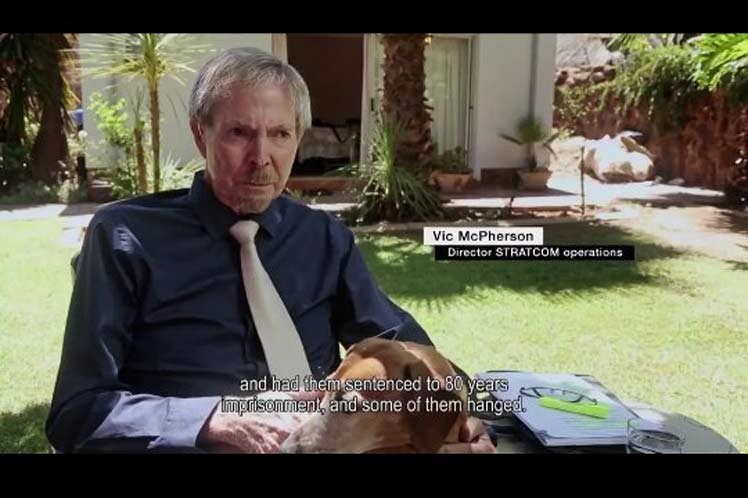
A particular impact had on the citizens of this country was that McPherson narrated these events sitting comfortably in his garden and petting his dogs, who considered the most chilling images of this documentary.
These and other revelations by several of the regime’s exaggers, including former Chief of Intelligence Niel Barnard and former Chief of Police in Soweto Henk Heslinga, brought new admiration in the nation for this woman, considered the face of South Africa during the dark years of repression.
DESERVED HOMAGE Tributes to Winnie, who died on April 2 at the age of 81 after a long illness, began the day after her death with official mourning, flags at half-mast and tributes throughout the country, which had their highest expression in the memorial on April 11, held at the Orlando District Stadium in Soweto. 
Songs and dances, part of the traditional liturgical ritual of South Africa’s black population, were a constant during the more than four hours of tributes led by Vice President David Mabuza.
In his words, the Vice President said that ‘we are here to mourn the death of a true revolutionary and leader of our liberation, to mourn the death of the Mother of the Nation because a tree that protected us has fallen’.
Mabuza, also vice president of the ANC, said Winnie remained relentless until the last years of her life and throughout her life’you reminded our daughters and mothers that women are powerful and can stand up to men’.
A similar ceremony, convened by Julius Malema’s opposition Economic Independence Fighters (EFF) party, took place on the same day in the Free State province.
TRIBUTES Analysts in South Africa consider that one of the most heartfelt tributes was that of Mandela’s widow, Graca Machel, who dedicated a letter to’her elder sister’ where she says that’you have become one of the brightest stars in the sky, where you will remain forever radiant’.
The extraordinary life you led is an example of great strength and inexhaustible passion, a source of inspiration for all of us on how to face challenges with courage, firmness and unwavering determination…. Thank you for your brilliant wisdom, fierce challenge and elegant beauty’, Graca Machel’s message expressed.
Government and political leaders from various organizations, including the Communist Party, the EFF, the Inkatha Party, and the ANC youth and women’s leagues, among many other voices, expressed their admiration, respect and appreciation for Winnie Mandela’s years of selfless struggle for South Africa’s liberation from apartheid. In the final farewell to Winnie, President Ramaphosa said that her life was dedicated to the unity of the oppressed of all nations and in death ‘unites us all, those close to her and those from many nations and continents, to pay homage and remember her with affection’.
She has shown in her death that our many political and racial differences have been overshadowed by our shared desire to follow her example in building a just, equitable and caring society, she said. The president said Winnie’s conscience and convictions left her no choice but to resist because’she felt forced to join a noble struggle in her purposes, though dangerous to carry out, to speak out when others were silent, to organize, mobilize and lead when those who did were imprisoned or forced into exile. 
He recognized that she lived, like many South Africans, with fear, pain, loss and disappointment, but each day she rose up with the nobility of the human spirit… They tried to denigrate her with bitter, twisted lies…. they wanted to destroy her so that she would lower her eyes and show weakness, but she always stood up.
President Ramaphosa admitted in his eulogy that’we are forced to acknowledge that she often stood up alone….too many times we were not there for her’.
All who appreciated her and recognized her dedication promised to follow her example and fulfill her legacy.
arb/ir
Prensa Latina Correspondent in South Africa.
Fake News as Washington’s Weapons
Fake News as Washington’s Weapons
 By Manuel E. Yepe
By Manuel E. Yepe
http://manuelyepe.wordpress.com/
Exclusive for the daily POR ESTO! of Merida, Mexico.
Translated and edited by Walter Lippmann.
Let no one think that using falsehoods as a pivot for the projection and execution of U.S. foreign policy is an innovation or a novel contribution by Donald Trump. This has been a tradition in Washington’s foreign policy since the explosion of the Spanish battleship Maine in 1898 in Havana, which led to the U.S. declaring war on the Spanishmonarchy and whose aftermath was the rise of U.S. imperialism.
In 1997, the release of the feature film WAG THE DOG, a free adaptation of Larry Beinhart’s novel “American Hero”, starring Dustin Hoffman and Robert De Niro and directed by Barry Levinson, was very successful in the United States.
The film is about a spin doctor and a film producer who are inventing a war to distract voters’ attention from a sex scandal that would hamper the re-election of the President of the United States. The film was released a month before the Monica Lewinsky scandal and the subsequent bombing of the Al-Shifa pharmaceutical factory by the Clinton administration and generated numerous comparisons of reality with the film.
On tape, the President is caught falling in love with a young minor in the Oval Office two months before the election. The spin doctor decides to draw the public’s attention with a fictitious war against Albania in order to draw its media attention to this conflict by diverting it from the White House.
The deception initially takes effect by moving the election statistics in favor of the President. But then this clashes with the interests of the CIA, which favors the opposition candidate. All this then is complicated by a succession of dirt and perversions typical of American politics.
Fake news has become a “fourth generation” weapon. Inserted into the new information technology scenarios, it surpasses them widely in scope and validity, given that the scenario in which it is poured exponentially surpasses the level of dissemination of content through the computer media of social networks, where the false becomes true.
An example of recent false news used as weapons of war has been the case of acoustic attacks against U.S. embassy officials in Cuba.
This fake news was denied in many ways, including by an investigation conducted at the University of Michigan by researcher Kevin Fu. He determined that the alleged attacks “were caused by interference between two ultrasound sources very close to those affected: one, a listening and spying device; the other, an ultrasonic blocker of the device. In other words, it was the very espionage activities that the Americans carried out inside their embassy that caused the acoustic attacks that affected their own diplomatic officials.
A large number of previous verifications had confirmed the fallacy, but the aim of this fake news was not to rectify something, but to provoke tension and break ties between Washington and Havana in line with the political objectives of the Trump regime.
Another recent case was that of the poisoning in England of the Russian double agent Sergei Skripal and his daughter Yulia. The Russian government was automatically accused, allegedly the only producer of a chemical known as Novichok, which – it became known – is not only produced by Russian laboratories, but can be produced in several British laboratories. This showd that the treacherous accusation sought to discredit the Kremlin.
Worse still, there has been the alleged chemical attack by Syria on the city of Douma, recently liberated by the Syrian Arab Army from occupation by terrorist forces supported by the United States. A team of journalists from the U.S.-based One America News Network (OAN)-which is a purely conservative source of guidance and audience and supports Donald Trump-visited Douma. They publicly stated that it had found no evidence of the chemical attack which allegedly took place on April 7, making a mockery of its President.
The self-esteem of the US superpower’s foreign policy must be in a very bad way when it has to resort over and over again to falsehoods and manipulations to try to keep the idea of the invincibility of the US empire in the collective imagination.
May 3, 2018.
Peace in Korea Not an Impossible Dream
Peace in Korea Not an Impossible Dream
 By Manuel E. Yepe
By Manuel E. Yepe
http://manuelyepe.wordpress.com/
Exclusive for the daily POR ESTO! of Merida, Mexico.
Translated and edited by Walter Lippmann.
Calls for talks made by China and Russia, as well as the worldwide outcry for them, outweighed U.S. threats of war and got the two Koreas to sit down and speak and dialogue to prevailed over the cannons, at least for the moment..
Trump’s aggressiveness had to give in to reason, and what seemed less likely to be achieved on the Korean peninsula was dialogue for the sake of concord, peace and national reunification.
Objectively, because of what has happened so far, the only absolute loser for this universal achievement has been the US imperialist foreign policy. It sees its role as a guarantor of South Korea’s security threatened by a hypothetical danger of absorption by Democratic and Popular Korea, the US pretext for its control strategy in that region of Asia.
What is happening on the Korean peninsula today is the result of Washington’s policy of intimidation and threats of violence against Pyongyang, which has intensified considerably since Trump came to power. However, because of the wonders of imperialist propaganda, the media in the U.S. and the many media outlets around the world that are governed by the enormous financial resources that the world’s top power devotes to this, US pressure is presented as the source of the moves toward dialogue on the peninsula.,
It is true that this policy was not invented by the current president, just as it was not he who invented U.S. imperialism, but it is demonstrable that every time a government has responded with concessions to U.S. intimidation, the threats have materialized with the exercise of greater violence. In the Middle East, the centre of Europe and Latin America provides ample evidence.
If the hopes for peace on the Korean peninsula were to be attributed to a positive foreign influence, this could only be credited to the insistence with which Beijing and Moscow have called for a respectful inter-Korean dialogue for a satisfactory solution.
But it is clear that Pyongyang enjoys the national independence that is essential for the achievement of such dialogue, and Seoul, on the other hand, lacks such freedom because of its enormous political and military dependence on the United States.
The extensive and intense US military presence in the south of the Korean peninsula has always been the main obstacle to the efforts for the reunification of the Korean homeland.
The North has never given in to Washington’s demands, and the South has always lacked the necessary autonomy to assert its interests as a formally independent nation, due to the United States’ control over its defenses and war resources.
It was this circumstantial reality that led Pyongyang to propose a development totally independent of its national defence. These include nuclear weapons and ballistic missiles, productions monopolized by the highly developed nations, in which North Korea made autonomous inroads through enormous sacrifices for its objectives of expanding the material well-being of its people.
Credit goes to South Korean President Moon Jae-in who, since coming to power last May, has sought to bring the North Korean government closer to the people through dialogue and his insistence that Pyongyang participate in the Winter Games was part of that effort. It is recalled that in September 2017 President Donald Trump offended Moon, in his usual derogatory remarks, by calling him a beggar’, for his insistence on dialogue with North Korea.
Many endeavors will have contributed to the achievement of the admirable events announced today in Korea. At the same time, it must be recognized that the wisdom with which the Korean communists have defended the independence of their homeland has been decisive for the triumph of the Asian nation. It shows that the only way to curb the imperialists’ appetites in the contemporary world is by confronting all risks and not by making concessions.
It is hoped that, in the agreed-upon talks, the US President will seek to advance arguments to safeguard its atomic monopoly by calling for the non-proliferation of nuclear weapons as a principle for any agreement. For his part, North Korean Kim will advocate general and total denuclearization as the only form of truly democratic disarmament.
If it succeeds in achieving this goal, the much-vaunted Democratic People’s Republic of Korea will have laid the foundations for an education that the heroic Argentine and Cuban guerrilla fighter Ernesto Che Guevara has always advocated: “Imperialism cannot be granted even a little bit like this, nothing”.
April 30, 2018.
Cuba: LGBTI May Day Participation
Translated and edited by Walter Lippmann for CubaNews.
Massive parade of LGBTI activists and Cenesex workers this May Day
Around a hundred LGBTI activists and workers from the National Centre for Sex Education (Cenesex) marched in front of the Revolution Square on May 1st with Cuban flags and rainbow flags as a prelude to the eleventh edition of the Conference against Homophobia and Transphobia.
Mariela Castro Espín led the march, which this year was attended by a massive turnout of members of Cenesex’s community social networks, who from early on in the morning at the joined the crowds of people gathered in Havana in the early hours of the morning.
Among displays of respect and support from workers from multiple sectors and protesters from other countries, transgender, lesbian, gay and bisexuals shared the demonstration with all the people, just 72 hours before the start of the Cuban Conference against Homophobia and Tranphobia on May 4, whose main venue on this occasion will be the western province of Pinar del Rio.
In the previous hours, Cenesex published the official program for this eleventh edition of the Conference, which for the second consecutive year will advocate for schools without homophobia or transphobia.
I include myself once again in the motto of this Conference, which in a way also began this Tuesday with this greater inclusion of LGBTI people in the main demonstration of unity, revolutionary commitment and broad diversity that every year brings together the entire Cuban population.
Without further ado, some of the images showing Cenesex activists and workers at the celebration of this International Workers’ Day in the Cuban capital.
Who is Paquito?
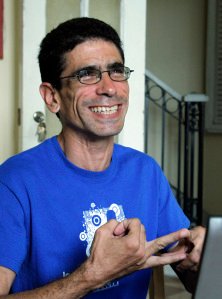
Cuban blogger Francisco Rodriguez Cruz known as Paquito from Cuba declares:
I am Fan of Jose marti, I am journalist communist and gay Photo taken on
Sept.29.2010. in Havana, Cu ba By Jose Goitia
I am Paquito, from CUBA; I am a Marti follower and a an author; I am a communist and gay journalist; I am a convinced and superstitious atheist; I am the father of a son whom I have adored and have been a partner for fifteen years with a seronegative man who loves me; I have been an AIDS patient since 2003 andam a survivor of non-Hodgkin’s lymphoma for more than twelve years; I am a university professor and a student of life; a follower of Cuban economic issues and a passionate devourer of universal literature; an incontinent and belligerent moderate; a friend of my friends and a compassionate friend of my enemies; often wrong and never repentant; a hardened and eternal enthusiastic optimist; alive and kicking; in short, another ordinary man who wants to share his story, opinions and desires with you…
Subscribe to Blog via Email
| M | T | W | T | F | S | S |
|---|---|---|---|---|---|---|
| 1 | ||||||
| 2 | 3 | 4 | 5 | 6 | 7 | 8 |
| 9 | 10 | 11 | 12 | 13 | 14 | 15 |
| 16 | 17 | 18 | 19 | 20 | 21 | 22 |
| 23 | 24 | 25 | 26 | 27 | 28 | |

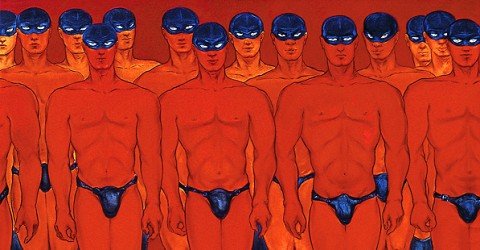


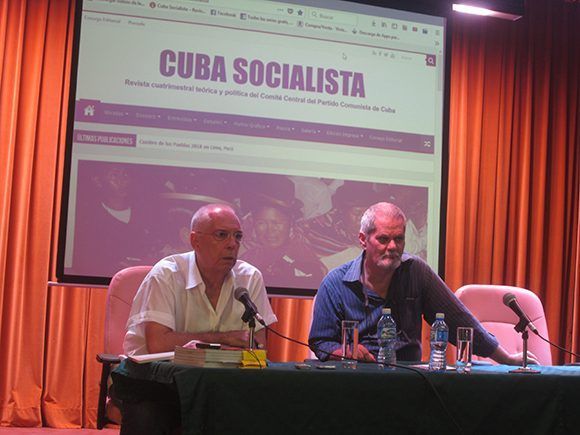



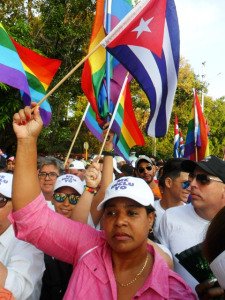

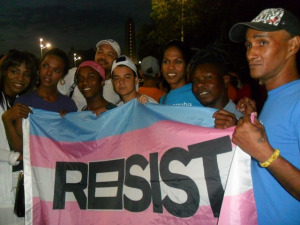





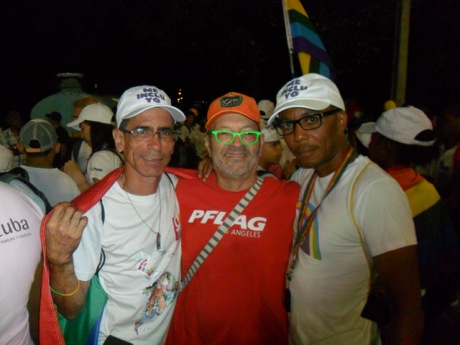
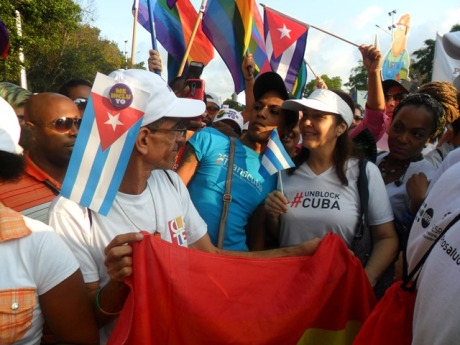
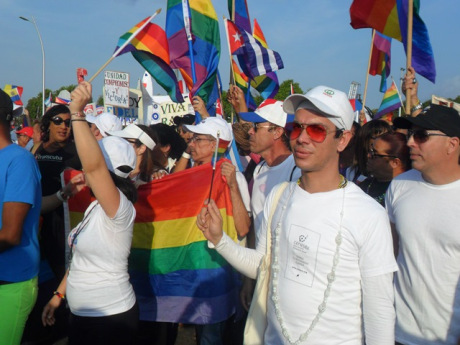


You must be logged in to post a comment.